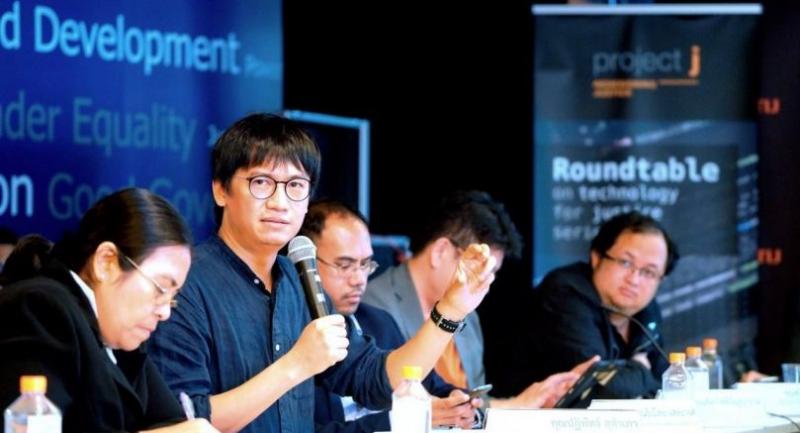Blockchain tech seen as a tool to curb corruption

EXPERTS AND social entrepreneurs have placed high hopes on benefiting from the advanced blockchain technology that would be able to play a major role in curbing corruption and enhancing transparency in social justice.
“Blockchain could be used to promote transparency of information for anti-corruption and to increase the power of investigation,” said Torplus Yomnak, founder of Hands Social Enterprise.
He was speaking at a seminar last week organised by Thailand Institute of Justice on “Blockchain technology for transparency and accountability”.
Torplus, who is a researcher on corruption, suggested that modern technology could be applied in three areas. First, blockchain can be used for government procurement with strong investigation by citizens.

Torplus Yomnak, founder of Hands Social Enterprise
By doing this, Torplus said, blockchain could be used to manage related information such as procurement and auction-bidding in the server of Comptroller-General’s Department in order to allow associate networks to get access to the information.
Blockchain would help facilitate the investigation of concerned agencies and enhance transparency of the government’s procurement process, he pointed out.
Second, the use of blockchain to promote good governance in the private sector.
The technology will help the public check the history and the background of a company in order to know its relation with others as well as to consider if there were any risks or credibility issues with the company, he explained.
Lastly, it can be used for electronic assets declaration of civil servants and state officers to avoid conflict of interest and non-transparent investigation process.
Using blockchain would prevent any errors that could happen when filing papers as well as the erasing of information, he said.
Moreover, it would be easier to search for assets and have various ways to investigate the declared assets.
For example, it would be able to investigate the changes in the assets over a period of time, or it can analyse if there is any conflict of interest and can check if the assets are in accordance with or reasonable with the owner’s lifestyle.
“Technology can fight against corruption but to achieve this the public needs to be alerted in following the investigation and supporting scrutiny that is free from influence,” Torplus said.
Blockchain is also able to solve the human trafficking issue and the non-transparent processes in the fishing industry, the seminar was told.
Patipat Susumpao, co-founder of Open Dream, a digital-led social enterprise, said his organisation was trying to create a prototype applying blockchain for the fishery industry by tracking the origin of fishes – from where they were caught until they were served on the table.
He said Thailand is the world’s leading exporter of canned tuna products but environmental activists said the production process and supply chain in the fishing industry still has problems in terms of transparency.
Patipat gave an example of British company Provenance’s pilot project in Indonesia. The British firm uses mobile, blockchain technology and smart tagging to track fish caught by fishermen with verified social sustainability claims. The goal is to stop many of the troubling practices within the illegal fishing industry, including slavery.
“Blockchain could help solve this issue as consumers can track where and what they are eating is coming from,” he added.
Moreover, the technology could also be used to identify the identity of labour in order to prevent human trafficking and child labour in the industry.
Varying advantages
The advantage of blockchain technology is how it stores the digital information by utilising computer networks that connect a huge number of computers to store and verify data.
The transactions recorded with blockchain will be safely stored with utmost transparency and will be difficult to duplicate or counterfeit.
Though they agreed in general that blockchain was not a universal remedy, participants said there were many benefits to establish the mechanics and a culture of transparency at both the individual and organisational level if it were used appropriately.
Because of its ability to act as a decentralised ledger, as a record of any type of transaction that needs a consensus or permission to enter and edit data on the blockchain database, industries from finance to healthcare are adopting it for varying uses.
The discussion raised several study cases from many countries and governments around the world which are going digital, embracing blockchain technology to improve their bureaucracies and resolve issues on civil rights and public interests.
Estonia uses blockchain to manage the information of identity card and the whole system of the civil rights.
South Korea has heavily invested in blockchain technology to promote investigation of their elections.
The United Nations High Commissioner for Refugees uses blockchain to store information on immigrants and also the mechanics of the digital money so the immigrants can use money in everyday life and for food.
In the private sector, the diamond industry uses blockchain to record and verify the source of the diamonds at every single step to end the trade in “Blood Diamonds”.
In addition, the justice system has kickstarted the development of an application that utilises blockchain to store digitalised evidence in order to reduce exposure to counterfeits and enhance user-friendliness and further develop the use of artificial intelligence in the future.
